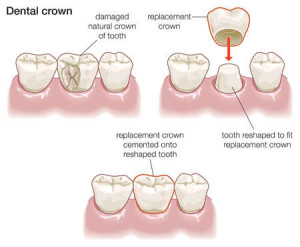A dental crown is a fixed prosthetic device that caps or covers a damage tooth. Crowns are also placed after dental implants to restore missing teeth. Dental Crowns are needed when dentist need to protect a weak tooth from fracturing, restore a fractured tooth, covered a tooth that has a completed root canal treatment, to cover a discolored tooth, or to make a cosmetic modification. For children crowns are recommended when decay is large and tooth can’t be restored with regular filling.
The dental crown procedure first begins with and exam. X-rays are taken and the dentist then checks the tooth to make sure the tooth decay or fracture is not affecting the pulp (nerve) of the tooth. If either the decay or fracture is affecting the pulp then root canal therapy may be needed before the tooth is capped. The reason is you might feel sensitivity due to how close the pulp is being exposed. The treatment starts with the dentist numbing the site where the tooth needs prepping, preliminary impression is taken to fabricate a temporary crown, and then the tooth is prepped to a certain size depending on the type of crown that is being made. After the preparation the dentist packs a cord around the tooth to get good detail of the tooth then takes an impression of the tooth. The impression is sent to the dental lab where the crown will be fabricated. After the impression is completed then a temporary crown is will be fabricated until the permanent crown is received. Temporary crowns are cemented with temporary cement, these crowns can fracture or fall off, and it is very important to return to the dentist if your temporary crown fractures or comes off.
There are many types of dental crown materials that are used for a permanent crown. Some examples are stainless steel, metal, porcelain fused-to-metal, ceramic, or full porcelain. The type of crown that will best for you will be based on the tooth and what the dentist recommendation. After permanent crowns are placed there are some problems that can happen, tooth sensitivity, loose crowns, chipped tooth on the opposing, or some crowns can fall off. If any of these problems occur, it’s best if you contact your treating dentist to see the issue and to see how it can be fixed.
Dental crowns or caps can last up to 5 to 15 years depending on how the crown is taken care of. Good oral hygiene will improve the duration of a crown, brushing and flossing is very important. Avoid opening packages with your mouth, chewing ice or clinching of your teeth can also decrease the lifetime of a crown. Have regular dental exams to monitor the crown. If you have any questions regarding crowns, you can visit your friendly staff at Smiles on Bristol Dentistry.


